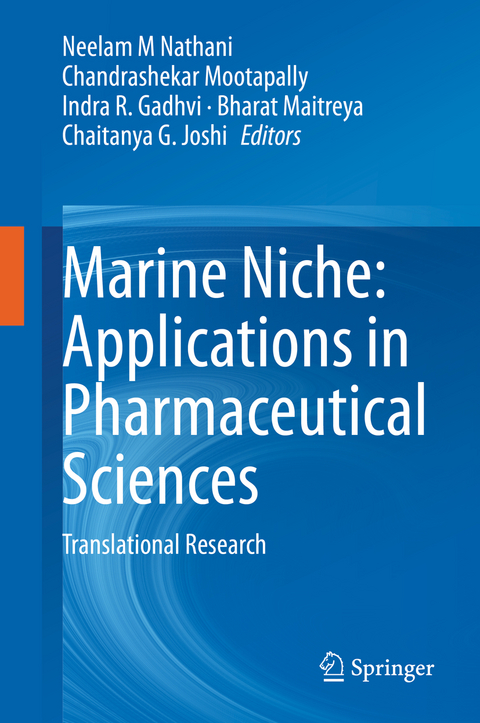
Marine Niche: Applications in Pharmaceutical Sciences
Springer Verlag, Singapore
978-981-15-5016-4 (ISBN)
The ocean remains a rich biological resource, and the vast untapped potential of novel molecules from marine bio-resources has caught the interest of more and more researchers. These novel biological compounds have never been found in terrestrial or other ecosystems, but only in this rich niche. Advances in sampling techniques and technologies, along with increased funding for research and nature conservation, have now encouraged scientists to look deeper in the waters. Aquaculture supports both tremendous seafood production and the bulk production of marine-derived drugs. Furthermore, molecular methods are now being extensively employed to explore the untapped marine microbial diversity. With the help of molecular and biotech tools, the ability of marine organisms to produce new biosynthetic drugs can be greatly enhanced. This book provides an extensive compilation of the latest information on marine resources and their undisputedly vital role in the treatment of diverse ailments.
Dr. Neelam M. Nathani, Ph.D., is a Post-Doctoral Researcher and visiting faculty at the Department of Life Sciences, Maharaja Krishnakumarsinhji Bhavnagar University. She received the CHARUSAT Gold Medal, presented to her by the former President of India, Dr. A. P. J. Abdul Kalam. She completed her Ph.D. in Microbiology at Saurashtra University in 2016 and has received fellowships including a Department of Science & Technology INSPIRE fellowship, SERB-DST National Post-Doctoral Fellowship and UGC DS Kothari Fellowship. Dr. Chandrashekar Mootapally, Ph.D., is a Post-Doctoral researcher and has successfully completed SERB-DST funded project as PI (National Post-Doctoral Fellow scheme) at the Department of Marine Science, Maharaja Krishnakumarsinhji Bhavnagar University. Holding a doctorate in Marine Biotechnology from Annamalai University, he has extensive research experience in microbial gene mining from molecular data, and is actively engaged in exploring the pelagic microbial community in the Gulf of Kutch. In his early career, he was involved in the molecular characterization of indigenous livestock from Karnataka, Tamil Nadu and the northeastern states of India. Prof. I. R. Gadhvi, Dean of the Faculty of Science and Head of the Department of Marine Science, Maharaja Krishnakumarsinhji Bhavnagar University, is a prominent naturalist and ornithologist in Gujarat, and has trained thousands of students in the field of wildlife and motivated them to practice nature conservation. He has also been associated with grassland conservation activities and wildlife research in the region including Blackbuck National Park, Velavadar, Gujarat, India. Prof. Bharat Maitreya, Professor of Botany at Gujarat University, completed his undergraduate and graduate degrees at Gujarat University witha specialization in Botany. He has 23 years of teaching experience and is actively engaged in exploring aquatic flora in the region. He has also worked as a Nodal Officer for the All India Survey of Higher Education. Prof. Chaitanya G. Joshi is currently serving as Director, Gujarat Biotechnology Research Centre (GBRC) and formerly Head of Department of Animal Biotechnology, College of Veterinary Sciences & A.H., Anand Agricultural University. He has been involved in extensive research using advanced molecular techniques like next-generation omics for more than a decade and actively engaged in inculcating research aptitude and zeal in the young minds by means of several successful training programs. He has published more than 200 research papers and 2 books, and has contributed significantly to global public scientific databases on molecular biology.
Chapter 1. Emerging Trends of biotechnology in marine bioprospecting: A New Vision.- Chapter 2. MarinOmics- Current and Future Perspectives.- Chapter 3. Marine Nutraceuticals.- Chapter 4. Small at size, big at impact: marine microbes, a boon for biotherapeutics.- Chapter 5. Marine Microbial Pharmacognosy: Prospects and Perspectives.- Chapter 6. Molecular Diversity and Pharmaceutical Applications of Free Living and Rhizospheric Marine Actinobacteria.- Chapter 7. Biodiversity of Marine Actinobacteria in Indonesia and Their Potential to Produce Bioactive Compounds.- Chapter 8. Marine-Derived Fungi : Potential Candidates for Anticancer Compounds.- Chapter 9. Marine Flora: Source of Drugs from the Deep-Sea Environment.- Chapter 10. Edible seaweeds as potential source of nutraceuticals.- Chapter 11. Seaweed and Sea Anemones proteins as a source of new pharmaceutical active principles.- Chapter 12. Marine-microalgae as a potential reservoir of high value nutraceuticals.- Chapter 13. Synthetic biology tools for microalgae.- Chapter 14. Malacology and Pharmacology: An integrated Approach with special emphasis on marine realm.- Chapter 15. Alkaloids from Marine ascidians (Tunicates) and potential for cancer drug development.- Chapter 16. Fish Protein Hydrolysates in Indonesia: Their Nutritional Values, Health Benefits and Potential Applications.- Chapter 17. Caulerpa: Ecology, Nutraceutical and Pharmaceutical Potential.- Chapter 18. Medicinal Prospects of Marine Flora and Fauna for Drug Discovery.- Chapter 19. Tapping the potential of marine resources in the arena of cosmetics.- Chapter 20. Marine Pharmacognosy: An overview of Marine-derived Pharmaceuticals.- Chapter 21. Compatible Solute Ectoines: Fancy Marine Product for Pharmaceuticals and Cosmeceuticals.- Chapter 22. In silico identification of drug targets and drug-like molecules against Vibrio splendidus LGP32.
| Erscheinungsdatum | 13.11.2020 |
|---|---|
| Zusatzinfo | 29 Illustrations, color; 15 Illustrations, black and white; XII, 458 p. 44 illus., 29 illus. in color. |
| Verlagsort | Singapore |
| Sprache | englisch |
| Maße | 155 x 235 mm |
| Themenwelt | Medizin / Pharmazie ► Pharmazie |
| Naturwissenschaften ► Biologie ► Biochemie | |
| Naturwissenschaften ► Biologie ► Mikrobiologie / Immunologie | |
| Naturwissenschaften ► Chemie ► Organische Chemie | |
| Naturwissenschaften ► Chemie ► Technische Chemie | |
| Technik | |
| ISBN-10 | 981-15-5016-6 / 9811550166 |
| ISBN-13 | 978-981-15-5016-4 / 9789811550164 |
| Zustand | Neuware |
| Informationen gemäß Produktsicherheitsverordnung (GPSR) | |
| Haben Sie eine Frage zum Produkt? |
aus dem Bereich


